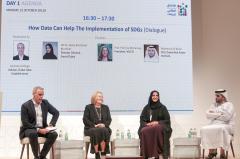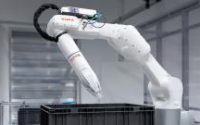UN World Data Forum 2018 Explores Emerging Technologies’ Role In Redefining Role Of Government
Emerging technologies and their role in redefining the role of Government were the subject of thorough discussion in a session on day one of the second UN World Data Forum, organised by the Federal Competitiveness and Statistics Authority (FCSA) in Madinat Jumeirah on October 22-24, 2018.
The session brought together Her Excellency Amina Jane Mohammed, Deputy Secretary-General of the United Nations, and Her Excellency Dr Aisha Bint Butti Bin Bishr, Director General of Smart Dubai, the Government entity tasked with leading Dubai’s transformation into a full-fledged smart city and one of the happiest in the world.
The speakers stressed the importance of partnerships to truly capitalise on emerging technologies. “The SDGs are a collective responsibility – a universal agenda,” said H.E. Mohammed. “Data offers a great advantage in this day and age; it allows for real-time feedback and goes beyond measurement of data to forecasting and planning ahead.”
“Having a global data community is essential for integrating big data, AI, the Internet of things, Blockchain technology, robotics, etc.,” H.E. added. “These are all high-potential technologies, but there are gaps in the literacy for these technologies. This is happening because young people are not sufficiently engaged and trained to use these modern technologies. The current average age of UN staff is slightly below 40; we need to work on involving the youth in the UN to tap into their skill and learning capabilities and channel them to achieve the SDGs.”
For her part, H.E Dr Aisha outlined the procedures that the federal and local governments in the UAE are implementing to expedite the integration of these advanced technologies into their operations and services.
“Dubai is on the fast track to having a paperless government by 2021,” H.E. said. “The emirate has fully embraced Blockchain technology, expediting and digitising all of its applicable transactions, and securing its lead as a prime destination for foreign direct investments (FDI) into the advanced sectors of emerging tech, artificial intelligence, and robotics.”
H.E. Dr Aisha went on to highlight Smart Dubai’s major achievements in the way of smart technologies, including its flagship AI-powered city advisor “Rashid”, the recently launched UAEPASS (a single, secure digital ID and signature for UAE citizens and residents), and Dubai Pulse, the digital backbone of the city bringing together data from various government entities.
Commenting on the Forum on the sidelines of the session, Dr Aisha said: “With a mission to embrace advanced technologies and transform Dubai into a world-leading smart city, Smart Dubai has a vested interest in data – it is the oil of the future and the backbone of any smart city transformation. This makes an event like the UN World Data Forum all the more essential and we are delighted to be taking part in it to explore international best practices and share our expertise and knowledge in the data sector.”
“In this day and age, humans are generating and consuming colossal amounts of data, while tech companies mine increasingly large volumes of sensitive data about individuals, including personal details, contacts, location, media and credit card information,” H.E. Dr Aisha added. “This raises important questions regarding privacy, security, and the ethical use of data and technology – all essential elements in devising initiatives and mechanisms to utilise data and analytics for the wellbeing and happiness of the community.”
The second UN World Data Forum – set to be held for three days on October 22-24, 2018 – will welcome more than 2,500 data experts, policy-makers, and representatives from academia, private companies and civil society organisations (CSOs) from around the world. The event follows the inaugural Forum, which took place in 2017 in Cape Town, South Africa.









